Ultimate Guide to Choose IT Services For Small Business
Contents
Start-ups, small businesses, and solo entrepreneurs are constantly under immense pressure. It comes not only from the competition with other businesses but also from a limited in-house talent pool. At times like this, small businesses can alleviate that pressure by looking into business IT solutions suitable for their needs.
Why Do Small Businesses Need IT Services?
Focus on business goals
Each company has its own way of doing business that creates value for its customers. That is why more effort should be put into meeting organizational goals – not tackling technological problems. In smaller-scaled businesses, these tech problems slow down the whole process and severely hamper productivity
In many companies, IT departments maintain the flow of information throughout the organization and ensure data security. Due to this, it is doubly important to look into managed IT services for small businesses if you want to keep up with the rapid pace of change in today’s competitive market.
Save on Costs
A business’s operational costs can be huge, and IT services significantly help executives reduce that amount. Imagine working without the assistance of technology, manually logging in numbers and data. It is tedious, expensive (in terms of human resources and time), and highly prone to human error, which can cost millions in damage to the company.
By employing IT services, you can alleviate these issues – and that is just one aspect of it! Many problems in a company can be solved through implementing information technology, which all contribute to reducing your company’s operational costs.
Read more:
Hiring Offshore Development Team Guide for SMEs
Pros and Cons of Outsourcing for Your Business
How to Choose the Best IT Services For Small Businesses?
Choose the type of IT services you need
When deciding on IT services, you must choose between building your own in-house solution or buying a ready-made product. Each option has pros and cons, and the decision-making process should include strategic assessments of technical expertise, requirements, cost, resources, and data security.
IT solutions companies have spent years of trial and error optimizing their products, offering exact solutions for any problems you might have. However, these pre-built products, while powerful, might not be suitable for smaller-scaled businesses. You might not understand and utilize every software function while paying full price for all of them, essentially losing money on features you do not use.
This might have entertained you with the idea of developing what you need from scratch, but beware! This gargantuan task is not as easy and cost-saving as it seems. Whereas veteran IT companies do not need to hire experienced IT staff, you do, taking up significant time and resources that can be directed to other, more critical organizational goals.
Another option emerges: using an outsourced IT service provider. You have control over your product’s idea, architecture, and functionality, while an experienced IT company handles the development and maintenance of the software solutions.
Read more:
Cloud Computing Outsourcing Guideline 2023
10 Common Risks in Software Development | How to Minimize?
| Buy | Ready-made solutions | Ready-made solutions are created for the mass market and have to cover as many problems as possible. They might be too broad and unsuitable for smaller businesses’ needs, driving up costs unnecessarily. |
| Consultation service | A consultation service provides small businesses with a high-level overview of their industry and guides them in the right direction. No actual implementation is done by the service, however. | |
| Build | Scratch-building | More suitable for established businesses with a large in-house IT department; this costly method offers extreme flexibility, customization, and control. |
| Outsourcing | By outsourcing the development of IT solutions, small businesses retain control of the development process. At the same time, coding is relegated to experienced professionals from third-party companies. |
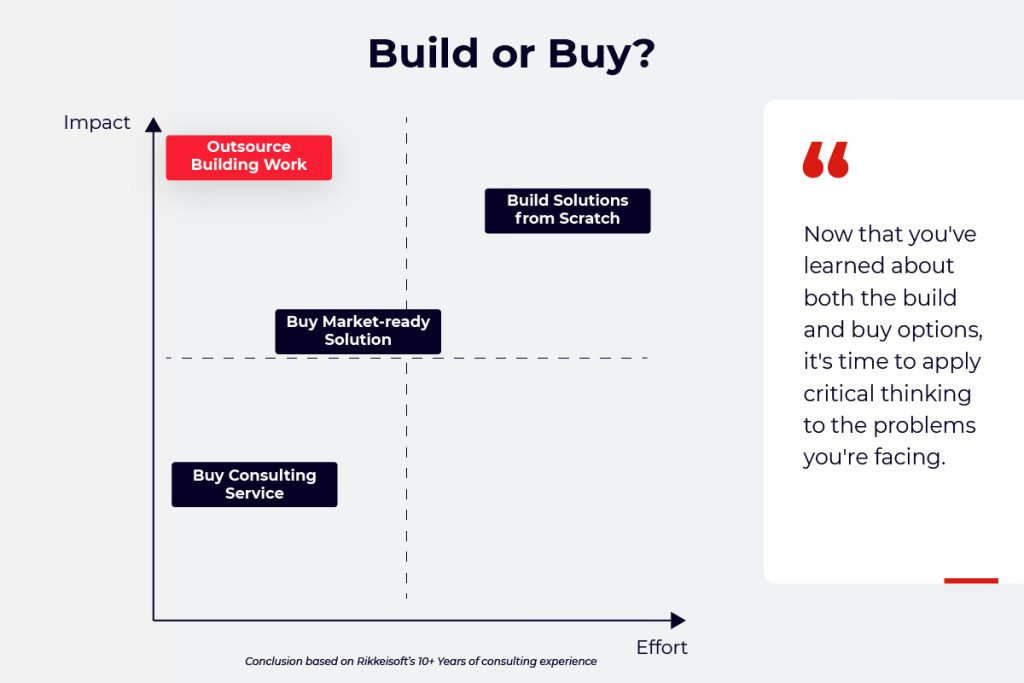
Scaling up a business stresses every aspect of its operations. Lack of strategic anticipation may lead to detrimental risks to a company. By utilizing IT consulting for small businesses, you can ensure the following elements in your IT flow:
Experience in the industry
As with any service, you will need to look for experience. A professional IT support service for small businesses should be capable of identifying core problems & solving them with suitable technology.
By asking IT service providers questions such as:
- Why did you use this technology to solve these problems?
- How did it help your customer save time and cost?
- What is the best technology practice in this industry?
You can get an idea of the IT provider’s experience regarding the most critical factors of your IT operation. On the other hand, an IT consulting for small businesses would observe your operation as a whole and how their currently available solutions can best benefit the business in the long run.
Responsiveness
In the services industry, speed and responsiveness are valuable and play a significant role in the overall customer experience. This is the same with IT services. No matter how good the product or service is, something wrong is bound to happen during integration. Before signing your contract with the IT service provider, confirm with them about:
- Post-delivery maintenance & support policy
- Response time for onsite support (less than 24 hours is recommended)
- Minimum response time for emergency cases. (less than 12 hours is recommended)
Certifications
An IT service provider’s professionalism and deployment capabilities are proven through their certifications. IT consultants’ primary expertise is understanding the foundation of your business, then providing answers for why a specific technology is the most suitable for your specific issues. To execute a solution, certified professionals with specific skill sets are required to deliver the expected outcome.
For software development, look for
- Capability Maturity Model Integration (CMMI)
- Microsoft Certified Solutions Developer (MCSD)
- Certified Information Security Manager (CISM)
For IT help desk and networking, look for
- Microsoft Certified IT Professional (MCITP)
- CompTIA Network+
- Cisco Certified Network Associate (CCNA)
- VMWare Certified Technical Associate – Network Virtualization (VCTA-NV)
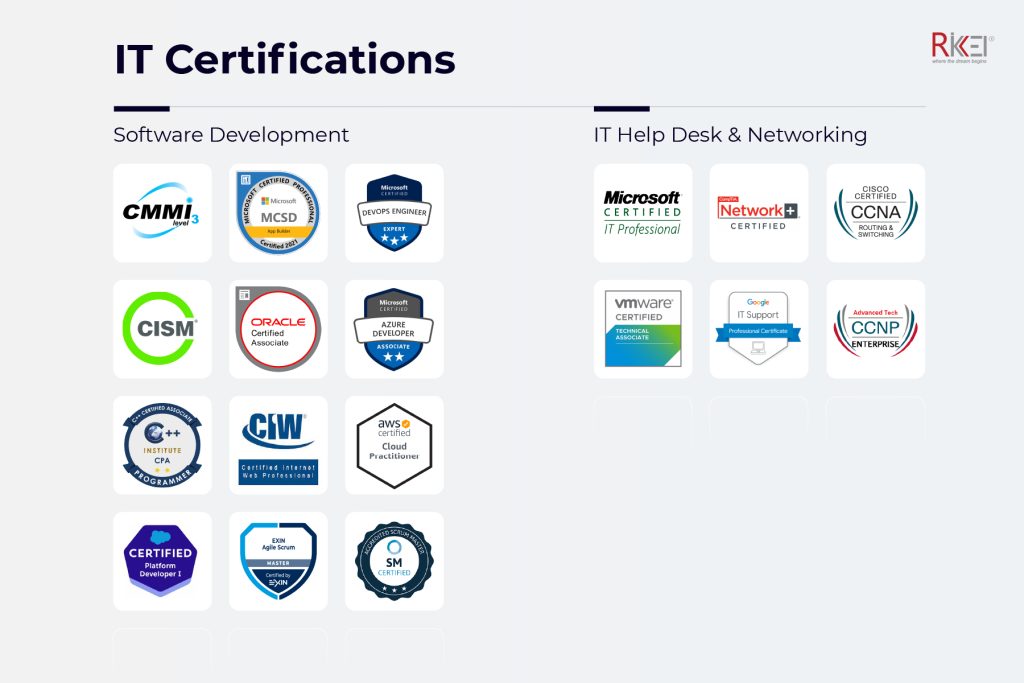
Re-consulting capability
IT consulting service providers for small businesses often operate reactively to save costs for the company. That means when a piece of software or hardware break, they will try to fix it ASAP. This is great for smaller businesses as their systems are more straightforward and can afford to have downtimes for fixes to be deployed.
When small businesses scale up, they may shift to a proactive service, where the IT service provider anticipates possible issues and hiccups and prevent them from ever happening in the first place. As their IT systems become more complex, businesses should now switch to a proactive IT support approach to ensure a continuous workflow. Re-consulting will enable professionals to tailor solutions that best suit your business needs.
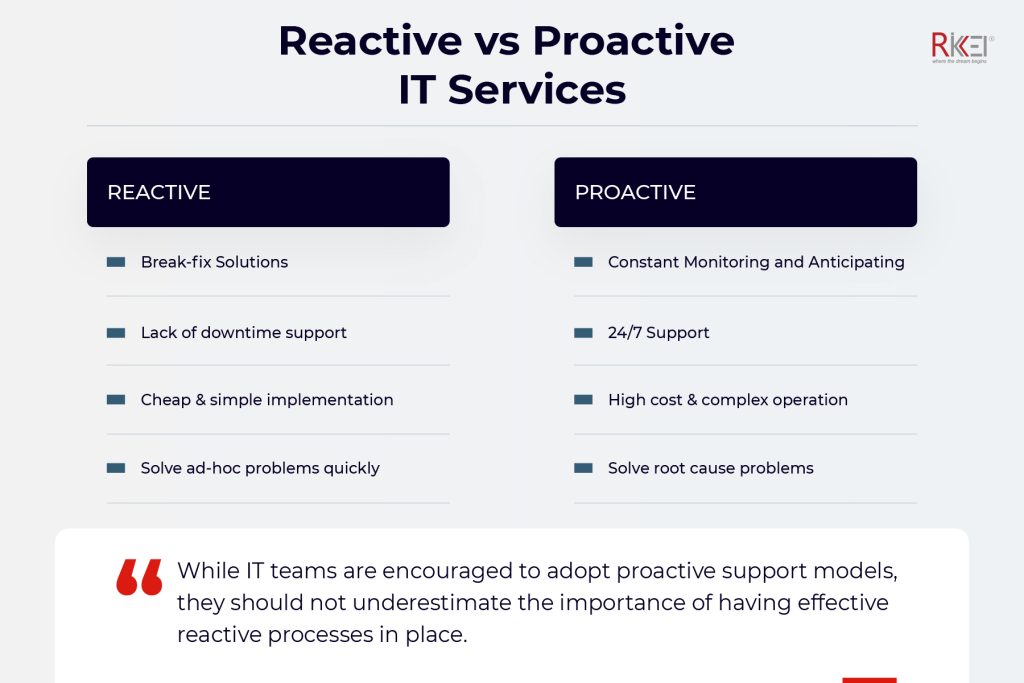
How Much Do Outsource IT Services for Small Business Cost?
As we have discussed, it is clear that for smaller businesses, the optimal way to acquire IT services would be to outsource – it helps them save costs while having top-quality services. However, there is no universal price for outsourcing – it varies depending on numerous factors.
Here are the leading players that determine the price of IT services for small businesses for your consideration:
Headcount
Break down your business into directories to determine which one needs the most IT support. The cost may vary depending on the number of users, amount of data, and servers needed.
Existing IT infrastructure
If your business already has an in-house IT team, integrating them with the outsourced personnel would significantly reduce the consulting cost and hastens the outsourcing process. Your team knows what they need to do and can quickly relay that information to your newly acquired staff. Otherwise, a deep understanding of your business problems is essential when working with an IT service provider.
Scalability
When choosing to outsource your IT services needs, you can choose between project-based and managed IT services. What you choose depends entirely on your company’s situation.
Project-based outsourcing is a suitable solution for ad-hoc problems – especially for small businesses on a tight budget. Meanwhile, managed IT services are more costly, but they can successfully help businesses with digital transformation. If you want to scale your business quickly, managed services are the better solution at a higher price.
Expertise
Nowadays, technology changes fast – employees need to keep up with the latest technology. IT professionals must keep their skills sharp with certifications like CMMi, AWS, CISM, CCSP CompTIA A+, CompTIA Network+, etc. These certifications are earned with a lot of effort by individuals from IT service providers; it may raise the cost significantly but also ensure the profession and service deployment.
You may interested in: The Power of Smart Outsourcing Cost Management
Popular Outsourced IT Services for Small Businesses
Technology enables small businesses to grow strong in a super-competitive market. A wide range of solutions is available to solve business problems efficiently and economically.
1. Software Development
In the Post-COVID-19 era, large enterprises and small businesses alike are shifting to hybrid working en masse. This demands that software be created to fit the new working culture.
Software companies are switching to the Software as a service (SaaS) model to adapt to market demand quickly. Small businesses can benefit from software tailored to their needs and maintained and updated constantly. As IT service providers fully manage and refine the tools and software, small businesses can lower their costs and put more effort into their business goals.
2. Mobile App Development
In the digital age, mobile users worldwide are increasing faster than ever. It is expected that in 2025, the number of mobile users worldwide will reach 7.49 billion.
For this reason, small businesses must build mobile-first apps and websites so that their products & services can reach their target customers faster and easier. This is why mobile development is one of the most popular and essential IT services for small businesses.
| Develop your mobile applications now using comprehensive mobile app development services. |
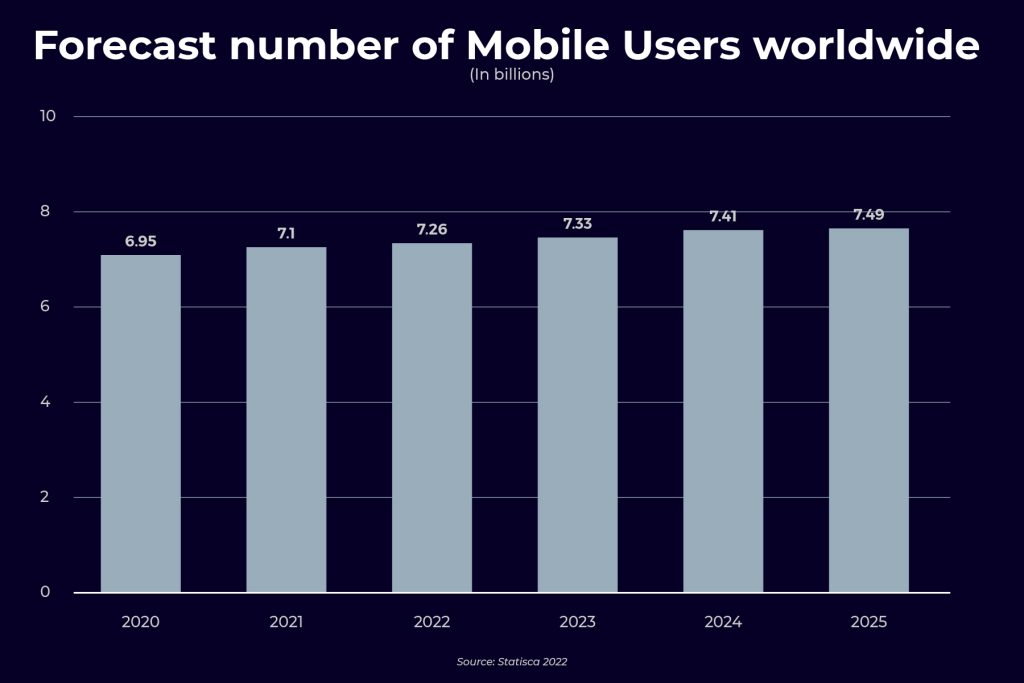
3. Business Website
A well-established website is crucial for any business as it enables businesses to accomplish multiple digital marketing strategies. To stand out from the competition, having an attractive website on the front end is not enough – it needs to provide users with a seamless user experience.
For small businesses, a functional website builds a strong online presence and supports a wide range of optimization methods in the background to improve sales & advertising activities.
Here are five questions to consult a professional before start building your website.
- How can we optimize the website’s back-end SEO?
- Which user experience framework is applied?
- How are mobile and desktop experiences streamlined?
- How to audit and analyze the website without using a third-party tool?
4. Managed IT Services
Using managed IT services means outsourcing every IT task to a third-party contractor and delivering to a business. Managed IT services for small businesses is a cost-effective solution instead of in-house IT infrastructure management and operation.
| Get comprehensive managed IT services for your entire IT ecosystem, including infrastructure, cybersecurity and software. |
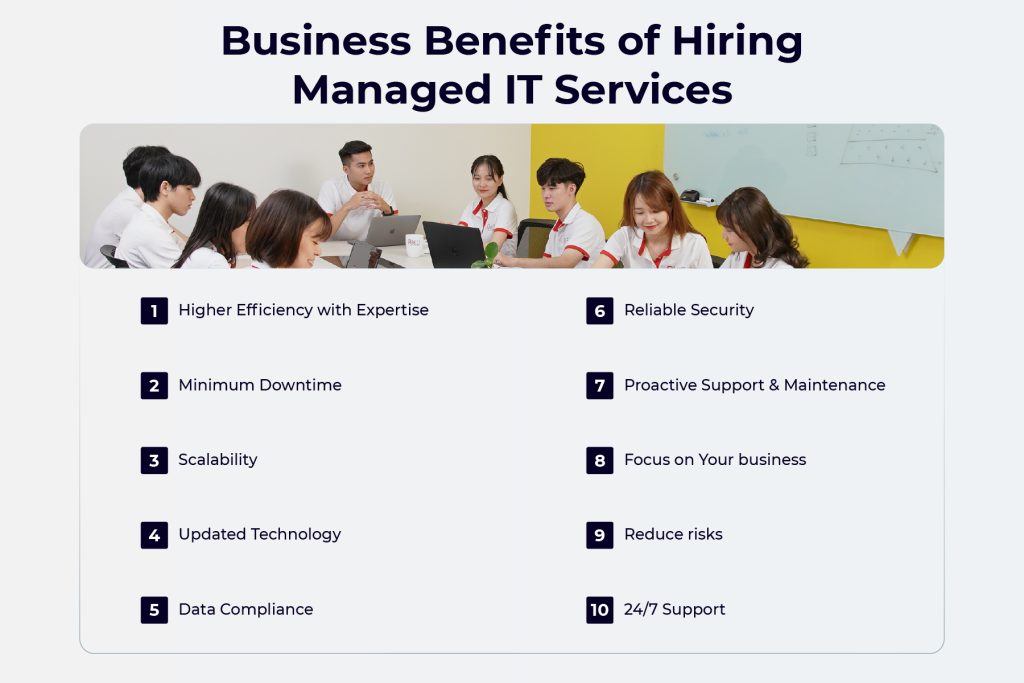
5. Data Analytics
The practice of data analytics in business supports decision-making by carrying out insights from a data pool. That data pool is now growing exponentially, coining the term “big data”.
A small business needs to set up an environment to collect, store and analyze data from scratch to make data-driven decisions and risk management. This can be hard to do without preexisting resources. Fortunately, IT service providers are more than willing to help with their qualified analysts and equipment.
6. Digital Transformation Consulting
Generally, a completed digital transformation framework includes:
- Mindset: Business owners shall be capable of outlooking their business to get how technology can leverage the business operation as a whole.
- Toolset: A platform of software & hardware that enables everyone in the business to execute the defined mindset.
- Skillset: The level of digital maturity of a business.
There are two ways of implementing digital transformation for a business:
- Bottom-up: From skillset to mindset
- Top-down: From mindset to skillset
Digital transformation consultants work together with small businesses to figure out the best implementation method for their company, then advise them on how to implement and utilize the digital solutions correctly and efficiently.
7. Cloud Solutions
Modern businesses are constantly searching for new ways to cut costs and optimize their operations. Cloud-based solutions do precisely that for businesses. Everything can be streamlined immensely on the cloud, saving both time and money for companies.
Generally, cloud services fall into two categories: infrastructure as a service (IaaS) and software as a service (SaaS). From a small business viewpoint, cloud computing can significantly reduce the burden of storing and managing data, resulting in reduced IT costs, unlimited scalability, and flexibility in customization.
Although there are many advantages, the operation requires a team of experts knowledgeable in cloud computing and consulting ability to optimize costs. This makes it the perfect service to be outsourced to an IT service provider.
8. Blockchain Solutions
Blockchain has the potential to help businesses build new solutions for difficult problems. Cryptocurrency is just a tiny fraction of the blockchain’s capability. It can support many industries:
- Financial: Improve liquidity, transparency, and free up capital.
- Health Care: Remove third-party verification for health information exchanges by directly linking patient records to clinical and financial stakeholders. Enable fast and secure access to personal medical records across the health care system.
- Government: Increase the transparency and traceability of public spending. Track asset registration. Reduce fraud and operational costs.
- Retail and Manufacturing: Improve supply chain management, cyber security, and smart contract platform.
Besides the above-mentioned solutions, blockchain services are predicted to help reduce costs for every business, regardless of size and scale.
10 Fastest Growing Industries with Technology
1. Retails & eCommerce
In this industry, the benefits of technology applications can be easily seen and felt. Any small independent retailer can perform sales and marketing through digital channels without a physical store. Brands are effortlessly built online and carry their presence on the backs of social media platforms.
Retailers are shifting focus to creating better customer experiences on their websites using cloud computing, data analytics, and AI. Businesses can personalize the customer experience by intelligently predicting their behavior patterns and delivering recommendations in real time.
See more: Software development for small eCommerce businesses
2. Finance (BFSI)
The Banking, Financial Services, and Insurance industry is improved by technological advancement thanks to digitalization in every part of the world. The pandemic has plunged this industry into a crisis of financial loss that requires a revolutionization to break through. With the application of technologies like AI and Blockchain in BFSI, the core operational strategy is enhanced in terms of customer-driven approaches and data-driven decision-making.
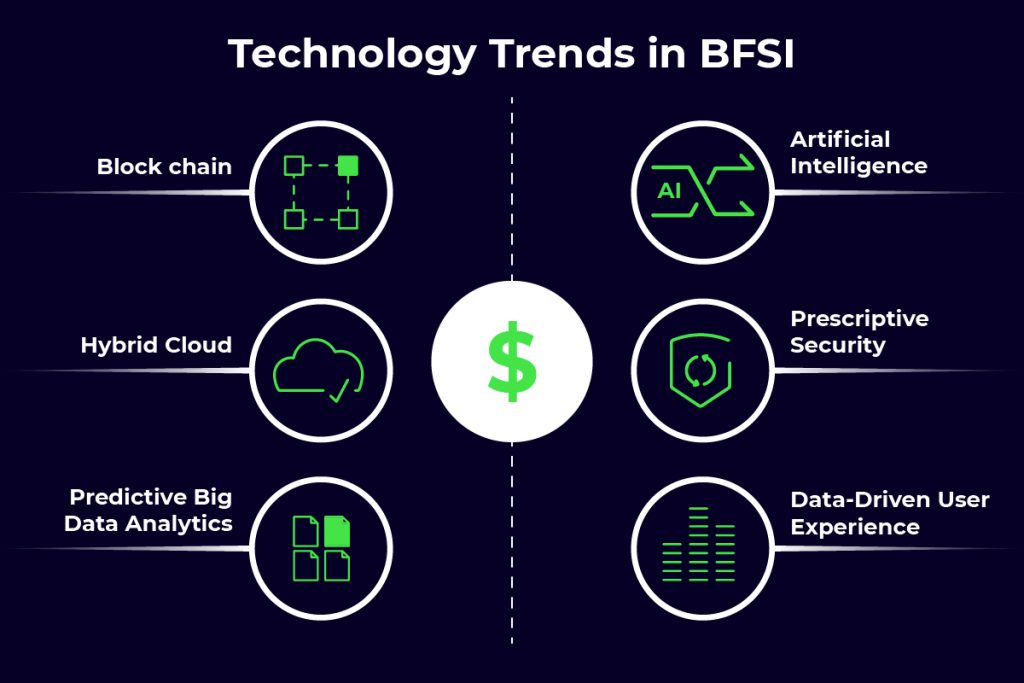
See more: Software development for small financial businesses
3. Media & Entertainment
The media & entertainment industry is constantly evolving on the surface and in how content is created & distributed. Here are technologies that promote the next generation of the industry:
- NFTs: Non-fungible tokens – blockchain-based certificates used to verify the ownership of digital assets and “unique” digital content. Despite its controversy, the industry has seen the sale of digital artwork skyrocket. NFTs are also integrated into video games, allowing players to own, earn, and sell in-game assets.
- Over-the-top (OTT) media services: Unlike such traditional social media platforms as Youtube, where consumers browse free content with a personalized ads experience, the OTT platform enables ads-free, high-quality content with synchronized subscription and distribution via multiple hardware platforms.
4. Manufacturing
Throughout history, the manufacturing industry has evolved by constantly researching and applying new technologies. Artificial intelligence, the internet of things, and 3-D printing, among other advanced technologies, are shaping the future of manufacturing by lowering production costs, increasing operational speed, and reducing errors.
5. Logistics
The logistics industry is all about speed: the speed of information transmission, product delivery, and resource allocation. Multiple information technology solutions have been applied in this field to solve complex problems. Some applications focus on shortening the time of information exchange & processing, while others enhance tracking capabilities.
- Bar Code System
- Decision Support System (DSS)
- Electronic Data Interchange (EDI)
- Radio frequency identification (RFID)
- Satellite tracking
6. Automotive
In the recent decade, the world has witnessed new trends in electric vehicles (EVs). The number of EVs on the road tripled from 2019 to 2021. This trend drove the automotive industry to apply information technology to develop and deliver smarter and safer vehicles. Technology innovations also push the automotive industry one step closer to reducing the number of vehicles on the road and matching the traffic demand simultaneously.
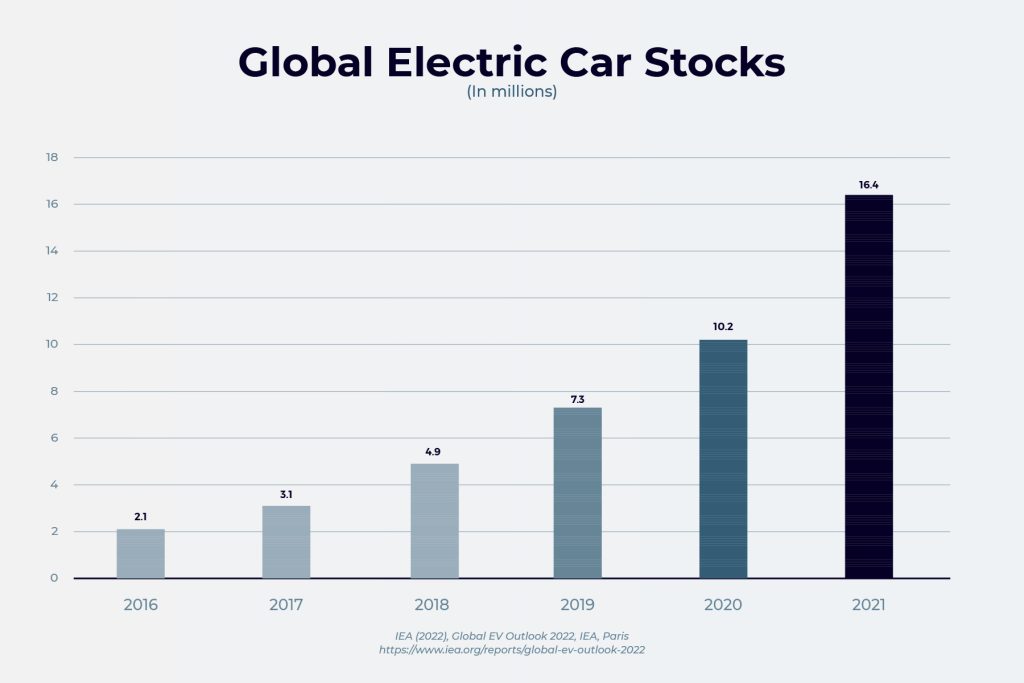
7. Public sector
Technology is a tool that helps governments deliver better services to their citizens. The major focal point of information technology for the public sector is citizenship data management. The foreseeable future of a well-built citizenship data structure is the reduction of administrative costs, better traffic management, crime statistics, and improved transparency of government functions.
8. Healthcare
The modern healthcare industry benefits from a wide range of technological innovations that enables doctors and nurses to do their job more efficiently. The pandemic has motivated the adoption of technological advancements in the healthcare system.
Open-source AI tools are being developed to dramatically empower researchers and doctors in enhancing diagnosis & drug development speed and accuracy. Telehealth and innovative healthcare apps have significantly progressed since the pandemic began in 2020. Care providers now regularly hold online sessions with patients over the Internet to discuss concerns and offer advice.
9. Education
In the past few years, technological innovations have vastly changed how people learn and share knowledge. Institutions and educators are forcing themselves to deliver knowledge to students differently. E-learning and online communities platform help students perform real-time peer-to-peer feedback and interactions. Big data and AI present a personalized education curriculum instead of a “one size fits all” approach.
10. FnB service
By now, the FnB industry has been revolutionized from farm to table. With farming data and food origin information stored on the cloud, consumers know more about the foods they eat. Digital menus allow customers to browse online before visiting a restaurant. When the pandemic struck, delivery apps were ready to bring the ‘from app to eat’ experience, transporting freshly-cooked meals from the restaurant to customers’ homes in minutes.
A Trustworthy Vendor Supporting IT Services For Small Businesses

Conclusion
In-house IT support and maintenance can be costly. IT services for small businesses help reduce costs without sacrificing service or reliability. Operating an internal IT department is typically not affordable for small businesses. Partnering with a dedicated business IT service provider will initially cost money, but their value will vastly exceed it.
More From Blog

April 4, 2024
Big Data Performance: Maximize Your Business Value
In today’s data-driven world, organizations are constantly generating and collecting immense amounts of data to understand their customers more deeply. This data, often referred to as “big data,” holds immense potential for organizations to seek opportunities and overcome challenges. But accessing and analyzing big data isn’t enough to have proper strategies; organizations must pay attention to […]

April 4, 2024
How Real-Time Data Analysis Empowers Your Business
In today’s fast-paced business landscape, the ability to quickly make data-driven decisions has become a key differentiator for success. Real-time data analysis, the process of analyzing data as soon as it’s generated, has emerged as a powerful tool to empower business across industries. By leveraging real-time data analysis, organizations can gain timely and actionable insights, […]
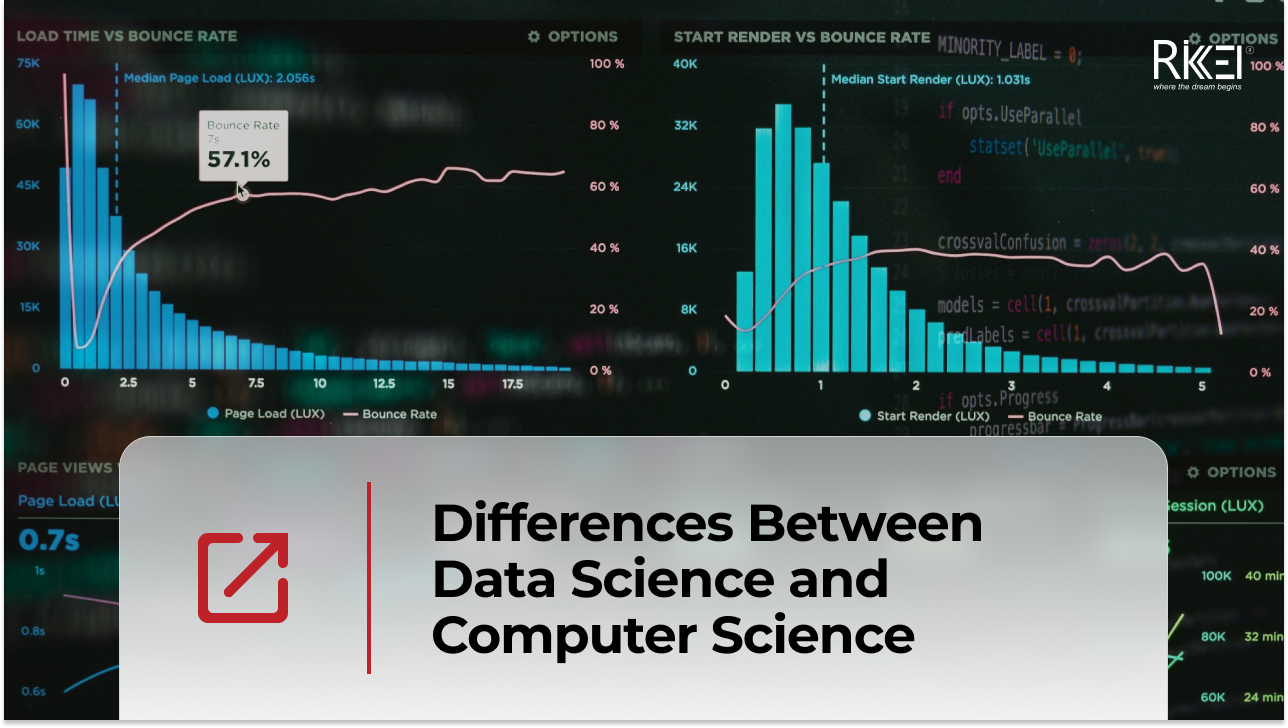
April 4, 2024
Differences Between Data Science and Computer Science
Data Science and Computer Science are distinct fields overlapping in certain areas but have different focuses and objectives. The article below will help you clearly understand the differences and the close connection between the two fields. What is Data Science? Data Science is an interdisciplinary field that combines scientific methods, processes, algorithms, and systems to […]
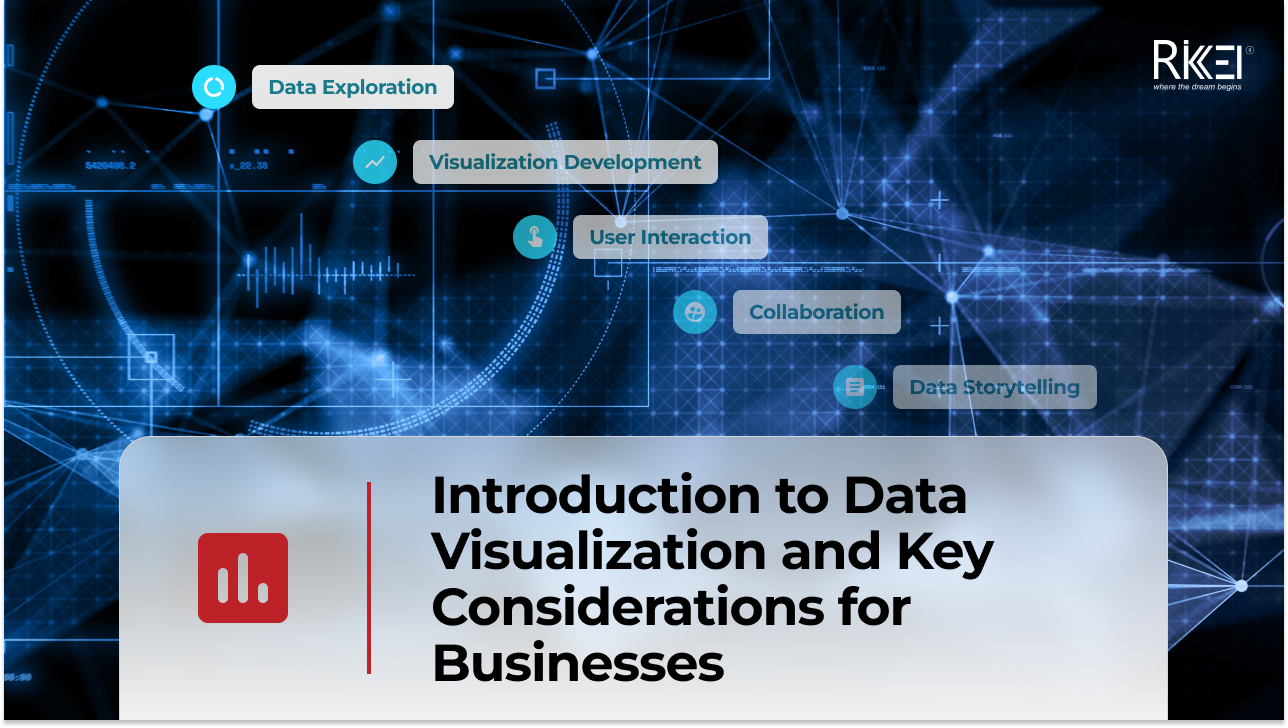
March 28, 2024
Introduction to Data Visualization and Key Considerations for Businesses
In your opinion, what is data visualization? Your main goal is to communicate your recommendations engagingly and effectively, right? To achieve this, let’s immediately explore a method that can represent information with images. What is Data Visualization? Define data visualization and their roles in organizations First, you need to find the answer to the question: […]
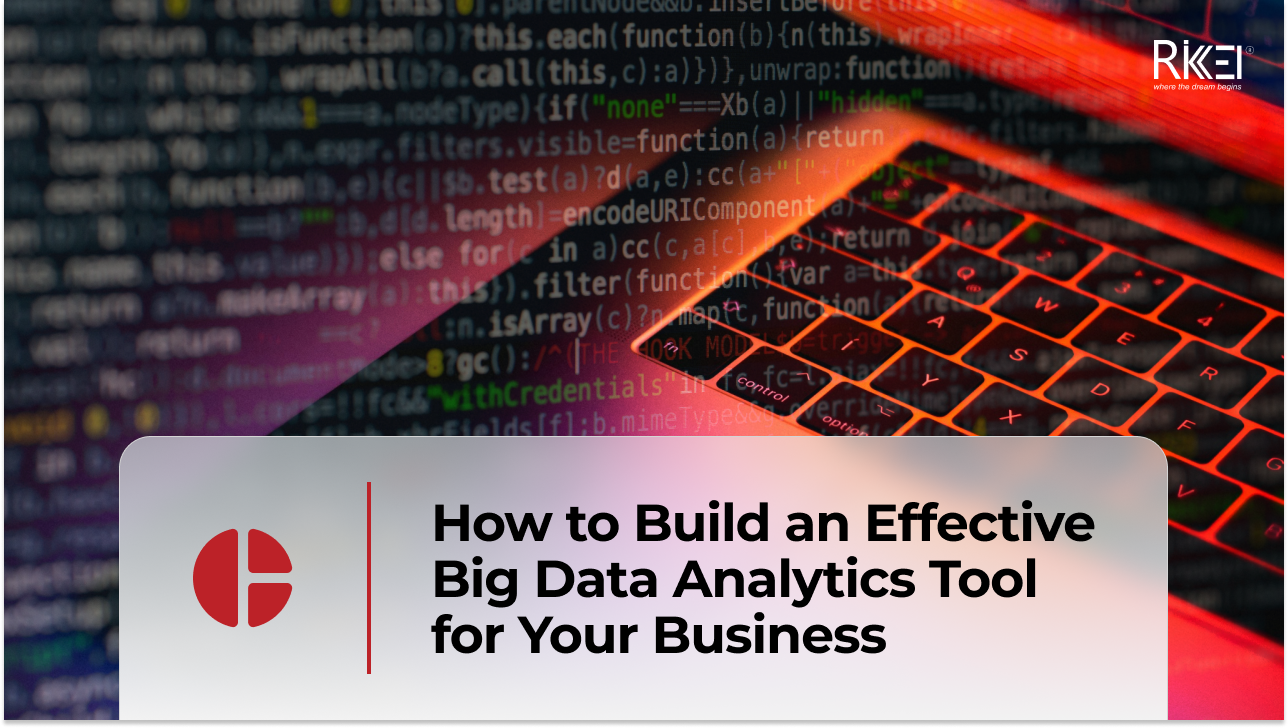
March 21, 2024
How to Build an Effective Big Data Analytics Tool for Your Business
Building an analytics tool for a business brings several significant benefits, especially in today’s business environment where data is becoming larger and more complex. So how to build an effective analysis tool for businesses, follow the article below! Assessing Business Needs Assessing business needs involves understanding the requirements, goals, and challenges of a business or […]
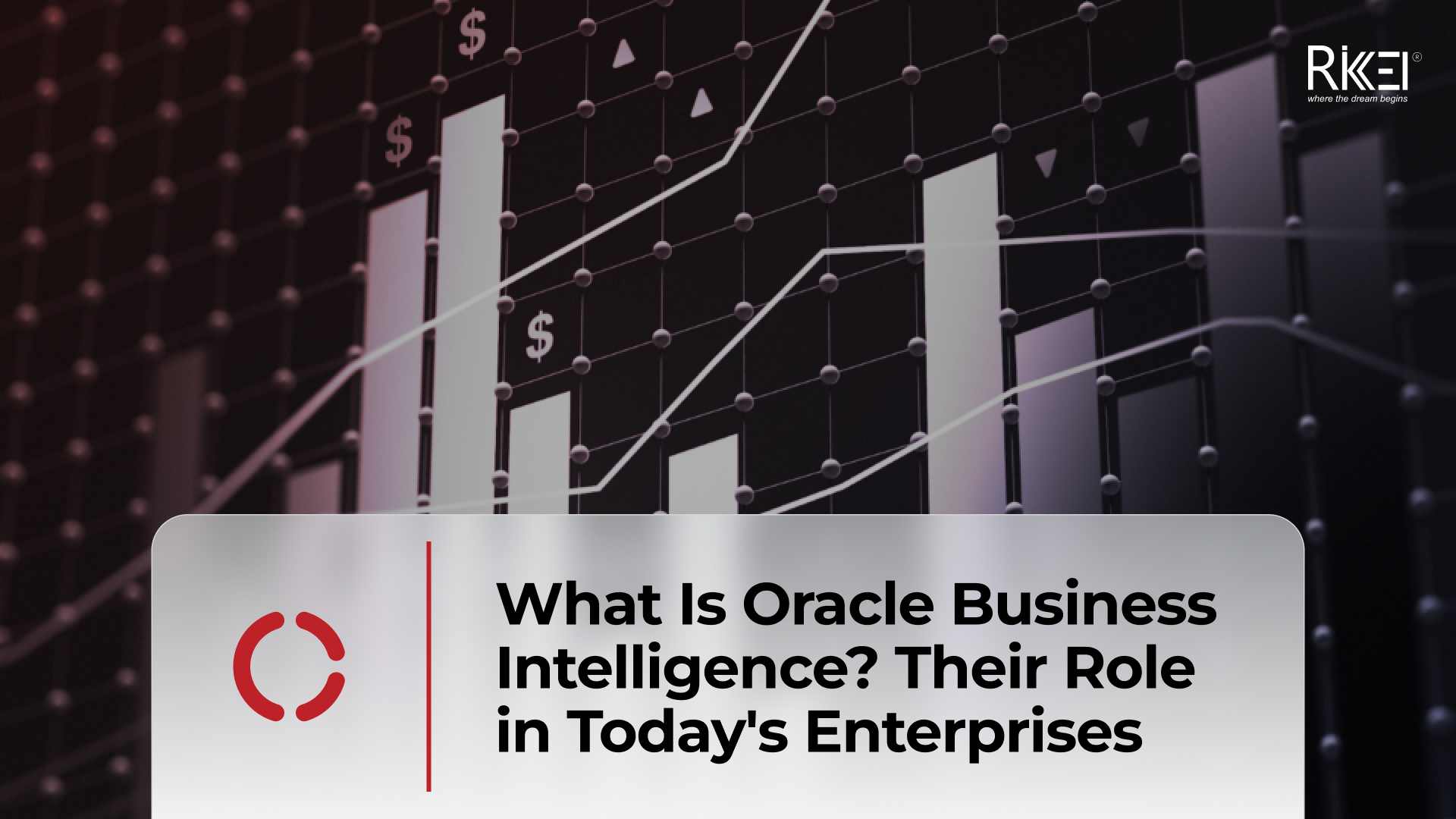
March 14, 2024
What Is Oracle Business Intelligence? Their Role in Today’s Enterprises
Oracle Business Intelligence (BI) refers to a suite of tools, technologies, and applications designed to help organizations collect, analyze and present business data. The primary goal of Oracle BI is to provide actionable insights to support decision-making within an organization. Oracle BI encompasses a range of products that enable users to gather, process and visualize […]

